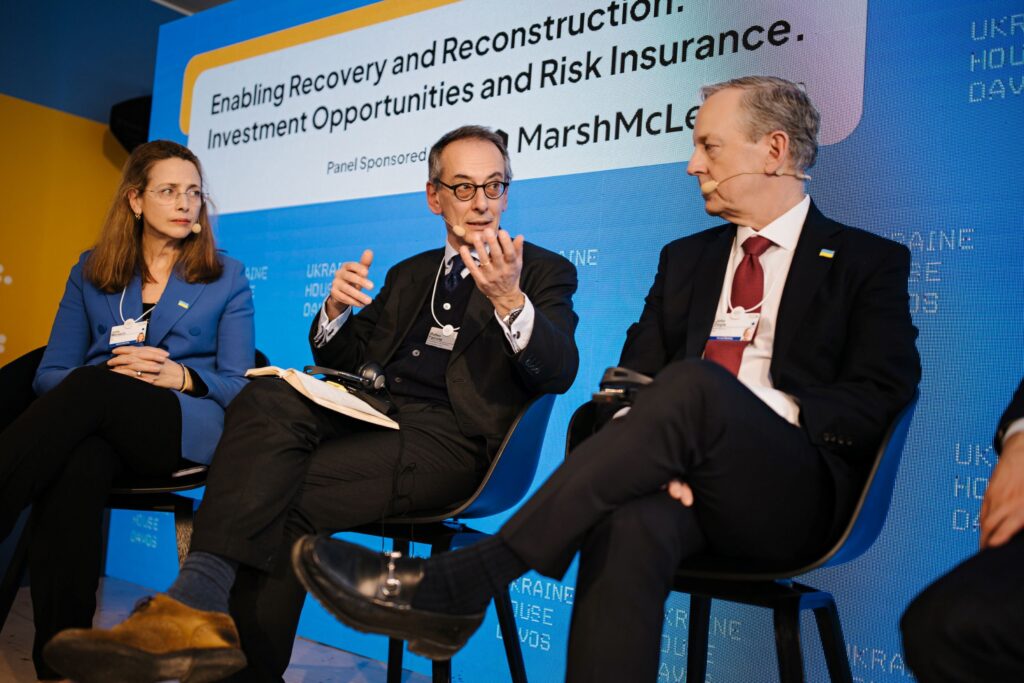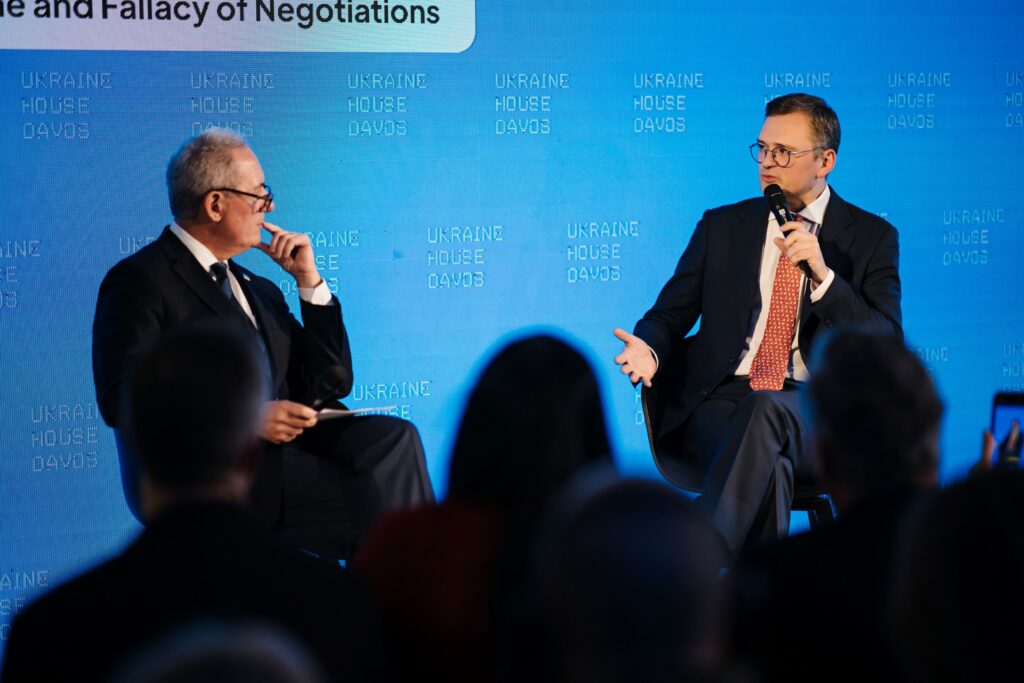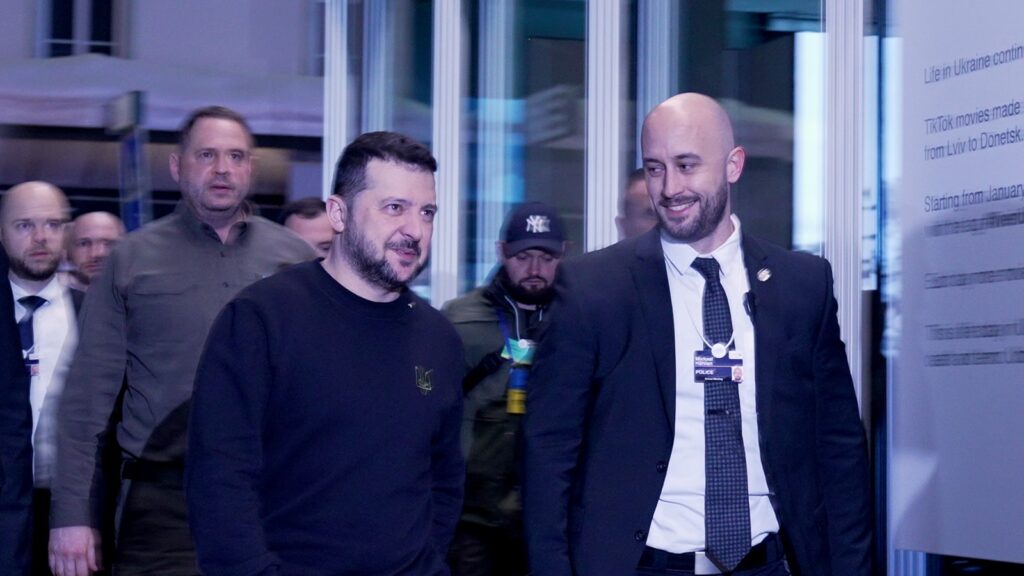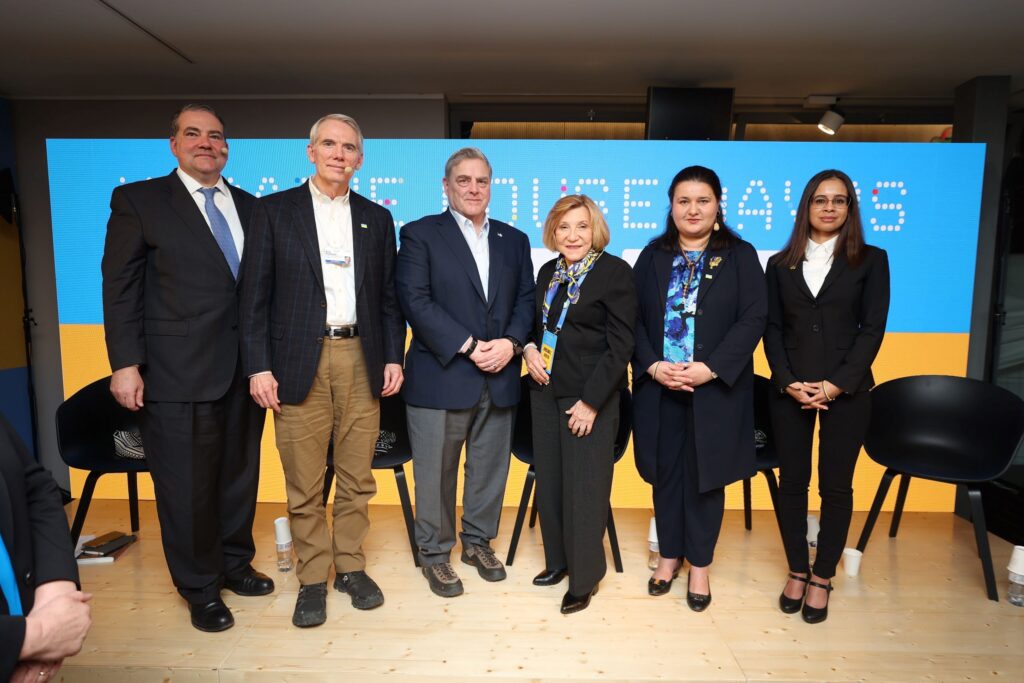It was the final day at Ukraine House today and our main focus was on the economy, its continuing resilience and its recovery.
Human capital is a crucial part of growing the economy and we heard first in the morning about the importance of supporting human capital and the challenges faced at this time – ‘Saving Ukrainians Saves Ukraine – Human Capital in War and in War Economy’.
Speakers were former President of Estonia Kersti Kaljulaid, Deputy Minister of Economy of Ukraine Taras Kachka, Svitlana Grytsenko, Member of the Board, Victor Pinchuk Foundation and Alexander Betts, Professor of Forced Migration and International Affairs, Oxford University.
Svitlana Grytsenko summed up the challenges – “organizing our people to win the war, starting to think about what to do after victory and also making sure we can keep the economy going today”.
The discussion was sober, reflecting upon the severe costs to human capital of the invasion and the serious incentives required to bring citizens back to aid with the country’s reconstruction.
But it was also uplifting about the progress Ukraine had made – like so many panelists throughout the week, Kaljulaid remarked on how noteworthy it was that Ukraine was undergoing a profound “radical economic structural change” and so aside from the war, the country was developing in an extraordinary way.
The next two panels looked at the incredible feat of Ukraine recovering its economy, rebounding at scale with impressive and diverse private sector investment.
In the first of these – ‘Ukraine 2024: Resilience Today Driving Rebuilding Tomorrow’, moderator Lenna Koszarny, Founding Partner and CEO, Horizon Capital set the context for this recovery, driven by the private sector:
“When we look at how many companies are operational, over 97% of companies are operational…what we want to cover today is the resilience on the ground”.
Speakers were Deputy Minister of Economy of Ukraine Volodymyr Kuzyo, Teresa Carlson, General Catalyst, John Patton, Argentem Creek Partners, Anna Believantseva, Co-Founder Esper Bionics and Mykhailo Shelemba CEO Datagroup – Volia.
The audience gained a real insight into the innovation of some of these businesses – Believantseva whose company produces bionic hands explained that they were the “only prosthetics company in the world where our users are frontline soldiers on duty” and further that the product had been on the cover of Time magazine as one of the 200 best inventions of 2022.
Patton, who has significant experience investing in Ukraine sang the praises of the private sector in the country – “there are great businesses with real people who are producing real things. Some businesses are even operating in a better way than they did before the war because of the commitment of the staff who stayed to work”.
The second of the economic panels was on ‘Enabling Recovery and Reconstruction: Investment Opportunities and Risk Insurance’.
The panel was moderated by Andy Hunder, President at American Chamber of Commerce in Ukraine and speakers were Deputy Head of the Office of the President of Ukraine Rostyslav Shurma, John Doyle, CEO Marsh McLennan, Matteo Patrone, Managing Director Eastern Europe and the Caucasus (EEC), European Bank for Reconstruction and Development and Julie Monaco, Global Head Public Sector Banking, Capital Markets and Advisory Division, Citigroup.
Patrone was emphatic about the need for reconstruction immediately: “The reconstruction happens now. There is no discontinuity point between the conflict and reconstruction. A number of things need to be rebuilt now, both in the private and the public sector”.
Monaco and Doyle also gave valuable banking and insurance perspectives on areas of interest and enthusiasm with Monaco noting that defense, technology, infrastructure and agricultural sectors were “investment needs which required solutions this year” and Doyle declaring that the sector was “all in on Ukraine”.
We closed for the day with our final panel of the week, debating the crucial stakes for the country in 2024 ‘What Is At Stake In Ukraine’.
The panel was moderated by Kerry Kennedy, President Robert F. Kennedy Human Rights. Speakers were Tymofiy Mylovanov, President, Kyiv School of Economics, Nataliya Bugayova, Institute for the Study of War and Steven Moore, Founder, Ukraine Freedom Project.
One of the biggest challenges Ukraine faces to continued funding of the war is Republican Party opposition in the US. Steven Moore had just returned from talking to Republican congressmen on the Hill and explained that it was messaging which was relatable around grievous war crimes, persecution of Protestants and appeasement of Russia leading to closer cooperation between Russia, China and Iran that really cut through with this base.
Bugayova began by praising the Ukraine House Davos organizers for the success of this week and set out starkly the reality of what this would mean for the US if they sat back in this conflict “If Russia is allowed to win in Ukraine, it would be a self-imposed strategic failure for the U.S”.
Kerry Kennedy concluded the panel and spoke for the House by lauding the bravery of Ukraine over the past two years “Ukraine reminds us of the bravery and the courage which is in all of our hearts”.
Ukraine House Davos is organized by Western NIS Enterprise Fund, Victor Pinchuk Foundation and Horizon Capital, and led by Executive Director, Ulyana Khromyak.
The Ukraine House Davos Organizing Committee is comprised of: Jaroslawa Johnson, President and CEO, Western NIS Enterprise Fund; Svitlana Grytsenko, Member of the Board, Victor Pinchuk Foundation; and Lenna Koszarny, Founding Partner and CEO, Horizon Capital.
Ukraine House Davos is made possible this year thanks to our generous sponsors, most notably our Gold Sponsors the Temerty Foundation and Interpipe, as well as our Panel Sponsor Marsh McLennan, and Networking Sponsor Advantage Ukraine.
Please visit our website to discover more:




